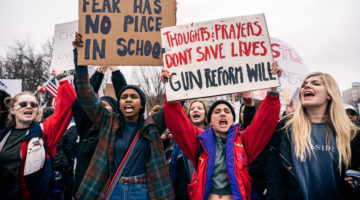
Photo by Cory Doctorow via Wikimedia Commons. An automatic rifle show on March 16, 2007.
In the days since Stephen Paddock opened fire on a crowd of 22,000 on the Las Vegas strip, the conversation has turned away from the victims and toward the politics — as well it should. For the third time in the last decade, America has witnessed the deadliest mass shooting in modern memory. First with Virginia Tech, then with Orlando, now with Las Vegas.
Mass shootings have become routine. Despite their tragedy, they are cliche. At some point, we as Americans have to be able to look in the mirror and say, “why does this keep happening?”
What are we doing wrong?
As is tradition with mass shootings, the GOP will rush to say that there’s nothing to be done to prevent these kinds of tragedies. This, we find hard to believe.
While mass shootings aren’t unheard of in countries outside the U.S., they are exceedingly rare. An analysis by the data-journalism outfit FiveThirtyEight found that in the last four years, there were 90 mass shootings in the U.S. (which, it should be noted, is much lower than some other estimates out there). The four countries with the next-most mass shootings only had 54 combined.
Surely there must be something we can do. Something more than a no-brainer bump stock ban that all politicians can support without alienating their base of voters. We won’t pretend to have the answers, but there must be some explanation as to why these incidents are far more common here than anywhere else.
Perhaps it would help if the Centers for Disease Control and Prevention were allowed to study gun violence in the first place. An amendment to a 1996 spending bill, the Dickey Amendment, makes it nearly impossible for the CDC to research the matter without risking its own funding. And without this research, it’s hard to say why America in particular seems to have such a problem with guns when other countries with high gun ownership per capita don’t.
Or how about we close the gun show loophole? Right now, if a gun is bought or sold privately, including at gun shows, there are no background checks run on the sale. Nevada tried to rectify this earlier this year, but failed because they asked the FBI to do the job and the FBI doesn’t have the money to do it.
The federal government, with all its billions and billions of dollars, can surely be bothered to make sure all gun sales are met with a background check? Because if these sales aren’t, why do we spend so much time and effort making sure sales through retailers are checked so thoroughly? What’s the tangible difference?
Opponents will say that strict gun control laws don’t work. Look at Chicago, they’ll say. What use are all those gun controls there?
“I think if you look to Chicago, where you had over 4,000 victims of gun-related crimes last year, they have the strictest gun laws in the country,” said White House Press Secretary Sarah Sanders. “That certainly hasn’t helped there.”
But this argument misses the fact that any restrictions in Chicago are made null by the fact that you can just hop across the border to Indiana and buy your guns there. So it’s true, what good are local gun laws when the only possible solution, if it turns out to be a solution, is a federal one?
If Congress won’t strictly regulate when and how people can get guns, and let’s be honest, it won’t, then maybe we should look to outside pressures. The power of the boycott, if wielded correctly, can be a powerful one. And, as The Washington Post’s Jonathan Alter pointed out, there are plenty of companies who could move their events and their conferences out of states who refuse to change. Companies are responsible for the safety of their workers in the same way that the government is responsible for the safety of its citizens.
Real, sensible change needs to come from the top, whether it’s corporations and giant interest groups who control their own messaging and influence or the federal government who can make the country safer for everyone. Maybe then things might be different.











